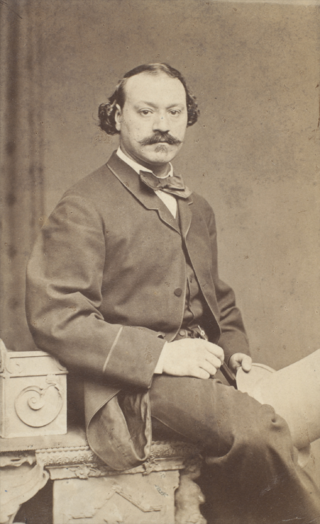
Rosina Penco (born in Naples in 1823, died in Poretta, near Bologna in 1894) was an Italian operatic soprano. She is most notable for creating the role of Leonora in Il trovatore by Verdi in Rome in 1853. [1]

Rosina Penco (born in Naples in 1823, died in Poretta, near Bologna in 1894) was an Italian operatic soprano. She is most notable for creating the role of Leonora in Il trovatore by Verdi in Rome in 1853. [1]
Rosina Penco sang in operas by Rossini, Bellini and Donizetti in various German theatres in 1850. She was praised for her fiery stage temperament and her virtuosic singing, in particular for an excellent trill. [2]
In Italy, she appeared in the title role of Verdi's Luisa Miller in Naples in 1851 and created roles in operas by Errico Petrella and Giovanni Bottesini. In 1853, she created the leading soprano role of Leonora in Giuseppe Verdi's hugely successful opera Il trovatore. She had appeared in Trieste the previous year as Azucena in Il trovatore by Francesco Cortesi, based on the same Spanish play as Verdi's opera. [3] Verdi prized her for her combination of vocal agility with fervid dramatic commitment. [1] The composer recommended her for the leading soprano roles of his subsequent operas La traviata and Un ballo in maschera , saying that Penco had much spirit and a good stage presence. She subsequently appeared as Amelia in Un ballo in maschera at Covent Garden and the Théâtre Italien, Paris. [3] Rosina Penco was praised for her sweetness of voice combined with highly dramatic acting and vocal agility. Her success in the leading role of Leonora in the enormously popular opera Il trovatore led to further engagements in the top opera houses in London, Paris, Berlin, Madrid and Saint Petersburg.
In 1858, however Verdi lamented that Penco had lost the fire that had distinguished her earlier appearances and had retreated into an old-fashioned manner of singing and performance like that of thirty years earlier. [3] Penco retired from the stage in 1875.
{{cite book}}: CS1 maint: location missing publisher (link)
Maria Anna MarziaAlboni was a renowned Italian contralto opera singer. She is considered "one of the greatest contraltos in operatic history".

Michèle Crider is an American lirico spinto operatic soprano. She has appeared in many of the great opera house in the world including the Royal Opera House Covent Garden, the Metropolitan Opera in New York, San Francisco Opera, Los Angeles Opera and the state operas of Vienna, Munich, Berlin and Hamburg. She has sung under Riccardo Muti, Daniel Barenboim, Zubin Mehta, James Levine, Nello Santi, Christoph von Dohnányi, Semyon Bychkov, Seiji Ozawa, Riccardo Chailly and Colin Davis. She is professor of vocal performance at the Mozarteum University Salzburg.

Maria Antonietta Stella was an Italian operatic soprano, and one of the most prominent Italian spinto sopranos of the 1950s and 1960s. She made her debut in Spoleto in 1950, as Leonora in Verdi's Il trovatore, a year later at Rome Opera, as Leonora in La forza del destino, in 1954 at La Scala in Milan, as Desdemona in Otello, in 1955 at the Royal Opera House in London as Aida, and in 1956 at the Metropolitan Opera in New York City, in the same role.

Herva Nelli was an Italian and American operatic soprano.
Mirella Parutto is an Italian operatic soprano and later mezzo-soprano.
Aprile Millo is an American operatic soprano who is known for her interpretations of the works of Giuseppe Verdi. Although she has performed at many of the world's leading opera houses and with many orchestras and ensembles internationally, Millo has spent much of her career appearing in productions at the Metropolitan Opera.
Sharon Sweet is an American dramatic soprano. Sharon Sweet has appeared in leading roles in several major venues in Europe and the United States and has made notable contributions to several recordings, in particular Lohengrin, Der Freischütz, Don Giovanni, and Il Trovatore. In 1999, she accepted a full-time teaching position at Westminster Choir College of Rider University. In a column in Opera News, Sweet stated that she made the move out of frustration with the current operatic scene which emphasized physical appearance over voice. She cited her struggles with Hashimoto's syndrome, a thyroid condition.
Eugenia Ratti was an Italian soprano, particularly associated with the Italian repertory. A lyric coloratura soprano of considerable charm, she excelled in soubrette roles in works by Cimarosa and Mozart such as Susanna, Zerlina, Despina, and in light Donizetti such as Adina, Norina, as well as Verdi's Oscar and Nannetta.

Elinor Ross was an American opera singer, a dramatic soprano particularly associated with the Italian repertory. She made an international career, appearing regularly at the Metropolitan Opera in New York City and at major opera houses in Europe and the Americas, in roles such as Puccini's Tosca and Turandot.

Romilda Pantaleoni was an Italian dramatic soprano who had a prolific opera career in Italy during the 1870s and 1880s. She sang a wide repertoire that encompassed bel canto roles, Italian and French grand opera, verismo operas, and the German operas of Richard Wagner. She became particularly associated with the roles of Margherita in Boito's Mefistofele and the title role in Ponchielli's La Gioconda; two roles which she performed in opera houses throughout Italy. She is best remembered today for originating the roles of Desdemona in Giuseppe Verdi's Otello (1887) and Tigrana in Giacomo Puccini's Edgar (1889). Universally admired for her acting skills as well as her singing abilities, Pantaleoni was compared by several critics to the great Italian stage actress Eleonora Duse.

Francesco Graziani was an Italian baritone and voice teacher. Graziani has been called the first modern baritone because his vocal attributes were well suited to the high-lying operatic parts composed by Giuseppe Verdi, with whom he worked.

Giulia Novelli was an Italian operatic mezzo-soprano.
Clara Jacobo was an Italian opera singer. She began her career around 1923 at the Italian provincial stages. She then emigrated to the U.S., where since 1928 she performed at the Metropolitan Opera of New York. Here she sang in the seasons 1928–29, 1930–31, 1933–34 and 1936-37 batches from the dramatic vocal category.

Maria Spezia-Aldighieri (1828–1907) was an Italian operatic soprano who had an active international career from 1849 up into the 1870s. She excelled in the coloratura soprano repertoire and was particularly admired for her portrayals in the operas of Giuseppe Verdi. Her performance of Violetta in Verdi's La traviata at the Teatro San Benedetto in Venice in 1854 is credited with popularizing the opera after it had initially flopped at its premiere in 1853. She was married to baritone Gottardo Aldighieri and is the great grandmother of singer George Aaron.

Maria Dragoni is an Italian operatic soprano active international career in major opera house from 1984 to present.
Sigutė Stonytė is a Lithuanian soprano and professor at the Lithuanian Academy of Music and Theatre.

Abigaille Bruschi-Chiatti was an Italian soprano who sang in the principal opera houses of Italy as well as in Latin America and at the Teatro Real in Spain. Amongst the roles she created were Amelia di Egmont in the 1882 posthumous premiere of Donizetti's Il duca d'Alba and Élisabeth de Valois in the 1884 revised version of Verdi's Don Carlos.
Bruna Castagna was an Italian mezzo-soprano.

Margherita Zenoni was an Italian opera singer who sang leading soprano roles in the opera houses of Italy and abroad from the early 1850s. She left Europe in 1867, first to sing with Annibale Biacchi's Italian opera company in Cuba and then to tour with Augusto Cagli's Italian opera company in Australasia. She remained with Cagli's company in its various incarnations until 1877, singing in India, Australia, New Zealand and South Africa. She died in Turin, her native city, less than a year after her return from South Africa.
Karina Flores, also known as Karina Grigoryan, is a Russian opera singer who has sung leading soprano roles with companies in her native Russia as well as in other European countries. For eight seasons she was a soloist with Helikon Opera in Moscow and has gone on to sing at the Teatro Regio in Turin, the Teatro Filarmonico in Verona, the Teatro San Carlo in Naples, and the Tyrolean State Theatre in Innsbruck, amongst others. She made her American debut in 2018 as the soprano soloist in a performance of the War Requiem at the Kennedy Center conducted by Gianandrea Noseda. On disc Flores appears as Lisa in Israeli Opera's 2012 recording of Pique Dame conducted by Vladimir Jurowski.